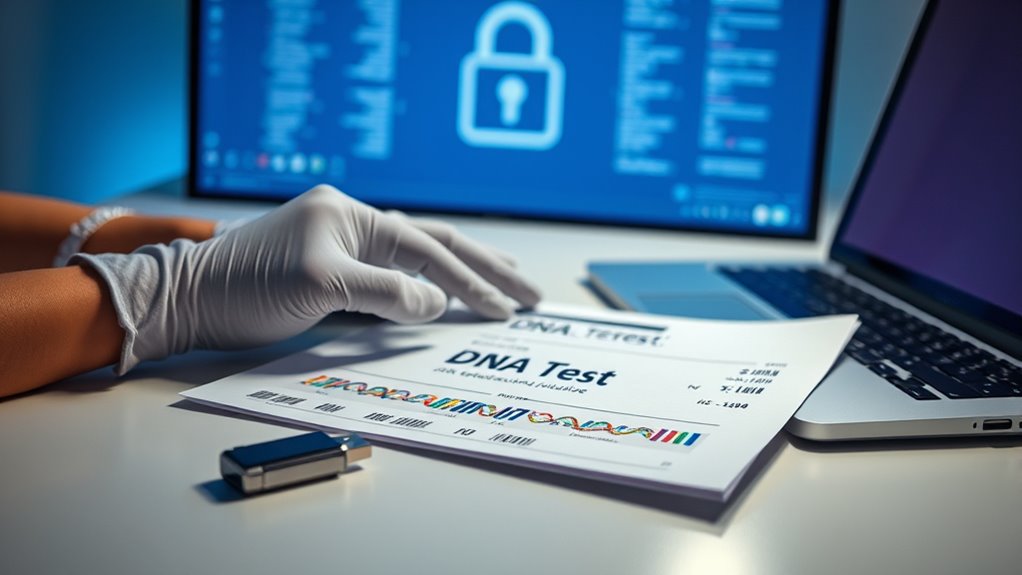To protect your genetic testing results, keep multiple copies in secure formats like password-protected files or external drives, and store them in locked locations. Use privacy-focused health record systems to control access, and avoid sharing detailed results on insecure platforms. Stay informed about laws like GINA that protect you from discrimination, and take active steps to monitor your privacy. Continuing will help you learn practical strategies to safeguard your sensitive information effectively.
Key Takeaways
- Store genetic test reports securely in password-protected files or encrypted external drives, and keep multiple copies.
- Be cautious about sharing results on unsecured platforms or social media to prevent unauthorized access.
- Use privacy-focused personal health record systems with controlled access and strong security features.
- Understand legal protections like GINA and review local laws before sharing genetic information with insurers or employers.
- Maintain active privacy management by staying informed, questioning data sharing purposes, and monitoring access to your genetic data.

Genetic testing can provide valuable insights into your health and ancestry, but it also raises important privacy concerns. When you decide to undergo testing, you’re revealing sensitive information about your family history that could impact not only your health decisions but also how others perceive your risk factors. This information can be *crucial* for identifying inherited conditions or predispositions, but it also has potential consequences, especially regarding insurance implications. Insurance companies may access genetic data to assess your risk profile, which could influence your coverage options or premiums. Understanding how to document your results carefully and protect your privacy is essential to avoid unintended consequences.
One of the first steps is ensuring that your genetic testing results are well-documented and stored securely. Keep multiple copies of your reports—both digital and physical—and store them in a safe location, such as a password-protected file or a secure external drive. When sharing your results with healthcare providers, make sure they are aware of the importance of confidentiality and that you trust their handling of your sensitive data. Avoid posting or sharing detailed results on unsecured platforms or social media, as this could expose your information to unauthorized access.
Being aware of how your genetic information could influence insurance implications is *vital*. In some regions, laws like the Genetic Information Nondiscrimination Act (GINA) provide protections against health insurance and employment discrimination based on genetic data. However, these protections don’t always extend to life, disability, or long-term care insurance. Before sharing your results with any insurer, review your local laws to understand what is protected and what isn’t. It’s often wise to consult with a legal or insurance expert before submitting your genetic information, especially if you have concerns about potential discrimination or privacy breaches.
When documenting your results, consider using a personal health record system designed for privacy and security. These systems often allow you to control who has access to your data and can help you keep track of your family health history, test results, and related notes. Maintaining detailed records can help you monitor changes over time and support discussions with healthcare professionals, but always prioritize your privacy by choosing reputable platforms with strong encryption and security measures.
Additionally, incorporating principles from creative practice such as attention and resilience can help you stay proactive and vigilant in managing your genetic information, ensuring you remain informed and empowered about your privacy rights. Ultimately, protecting your genetic testing results involves more than just secure documentation—it requires an active awareness of how your information is used and shared. Stay informed about your rights under local laws, and always question why and how your data is being accessed or shared. By taking these precautions, you can gain the benefits of genetic testing while minimizing risks related to privacy breaches and insurance implications.
Frequently Asked Questions
How Long Are Genetic Testing Results Kept on File?
Genetic testing results are typically kept on file for at least 5 to 10 years, but this can vary depending on the provider and privacy policies. If you’re concerned about privacy, ask how long they retain your data and what measures they take to protect it. Data retention policies are designed to balance your privacy concerns with legal or medical needs, so always review your provider’s specific guidelines.
Can I Access My Genetic Testing Results Anonymously?
Yes, you can access your genetic testing results anonymously, but it’s not always straightforward. Anonymity concerns and data privacy issues mean some labs require personal identification for access. While some services offer pseudonymous options, many still link results to your identity for legal reasons. To protect your privacy, research providers carefully and consider options that prioritize data privacy, ensuring your genetic information stays secure and confidential.
Are There Legal Protections Against Genetic Discrimination?
Yes, there are legal protections against genetic discrimination, like the Genetic Information Nondiscrimination Act (GINA). GINA prevents employers and health insurers from using your genetic privacy against you, ensuring you can’t be discriminated against based on your genetic test results. However, it doesn’t cover life insurance or long-term care. You should stay informed about these discrimination laws to protect your rights and privacy when sharing your genetic information.
What Rights Do I Have Over My Genetic Data?
Did you know nearly 80% of people want control over their genetic data? You have rights over your genetic data, including genetic privacy and data ownership. You can decide who accesses your information and how it’s used. Laws like GINA protect you from discrimination, but it’s essential to stay informed about your rights. Always review privacy policies and ask questions to guarantee your genetic information remains secure and under your control.
How Can I Share My Results Securely With Healthcare Providers?
You can share your genetic testing results securely by using secure online portals provided by your healthcare provider, which safeguard your data with strong encryption. Additionally, opt for encrypted messaging services when communicating sensitive information. Make sure to verify the platform’s security features before sharing, and avoid email or unencrypted channels. These steps help ensure your genetic data stays private and protected during the sharing process.
Conclusion
Remember, your genetic information is like a delicate thread woven into the fabric of your identity. Shielding it guarantees your story stays uniquely yours, not an open book for others to read. By safeguarding your results, you’re anchoring your privacy amidst a sea of data waves. Stay vigilant and treat your genetic data like a treasure chest—secure, guarded, and only opened when you choose to share your most personal story. Your future self will thank you for it.









